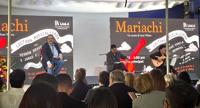
Jorge F. Hernández reading "El Mariachi." Photo by Brenda Verano
Celebrating Mexican and Central American culture, literature and music, LéaLA, the Spanish Book Fair and Literary Festival in Los Angeles, took place this past weekend at LA Plaza de Cultura y Artes in downtown Los Angeles.
For nine years, LéaLA, considered the largest Spanish-language book fair and literary festival in the United States, has put together a prestigious lineup of writers, free poetry reading sessions, academic discussion sessions and children's workshops, and this year’s edition was no exception.
LéaLA is an initiative organized by the non-profit University of Guadalajara Foundation USA and supported by the Feria Internacional del Libro de Guadalajara (FIL—Guadalajara International Book Fair), the Consulate General of Mexico in Los Angeles and LAUSD, as well as public and private institutions on both sides of the border.

(left) Marisol Schulz, director of LéaLA and (right ) Gustavo Padilla, President, University of Guadalajara Foundation USA. Photo by Brenda Verano
Marisol Schulz, director of LéaLA, said that the festival was founded because of a want and need to generate cultural communication between the United States and Mexico. Schulz told CALÒ News that the festival was the dream of Raúl Padilla López, who died in April 2023.
Raúl Padilla Lopez, a Mexican professor and academic, was the rector of the University of Guadalajara (UdeG) from 1989 to 199 and was also the president of the Guadalajara International Book Fair, which he founded in 1987.
“He was the man who started it all,” Schulz told CALÒ News. “One of his missions was to bring culture and education to this part of Southern California.” Schulz, who took over Padilla Lopez’s position, said that he was always thinking of the immigrant community, especially people from Guadalajara, Jalisco, who had immigrated to Los Angeles. “Outside Guadalajara, the biggest Jalisciense population is here. That was [his] goal, to bring education and culture to those immigrants and all of the Spanish-speaking people here.”
“Building Peace Together” was the theme for this year’s festival, aiming to showcase more than 40 publishers and writers of various Spanish-language titles, including “El invencible verano de Liliana” by Cristina Rivera Garza, which was one of this year’s Pulitzer Prize winners.

"El invencible verano de Liliana” by Cristina Rivera Garza. Photo by Brenda Verano.
Another Pulitzer Prize-winning author present at this year's festival was Cristina Rivera Garza, who was in one of many educational workshops, titled “Formas de nombrar y escribir mundos mas justos,” on Sunday.
Attendees also shopped for a wide selection of Spanish-language title books for children and adults.
This is the fifth time (with the exception of 2020) the festival is done at the Plaza de Cultura y Artes, a historical place for the Latino community in L.A. “The festival used to take place in the convention center and in 2019 we moved to LA Plaza, which is a very iconic place,” Schulz said. “We are very happy to be here [and] it’s just across from Placita Olvera and Union Station, and we feel that people can reach us from anywhere.“
Carlos González Gutiérrez, Cónsul General of Mexico in L.A., said the consulate helps promote events like this to Mexicans and Latinos living in L.A., and also provides support with the paperwork and documentation needed to bring many of the artists from Mexico to the U.S. for the festival. “Part of our responsibility was to help organize the event with the paperwork that needed to be done in order to bring so many artists and writers from Mexico here,” he said.
Spanish is the second most-spoken language at home in Los Angeles County, where 38% of residents, age five and older (3,480,588 persons), speak Spanish.
González Gutiérrez said government and academic institutions have a responsibility to engage with Spanish speakers living in cities like L.A. and promote the conservation of language justice and inclusion.

One of the many booths inside Lea LA. Photo by Brenda Verano
“It is the responsibility of all of us to make sure that the children and grandchildren of those immigrants feel close to Mexico. It's the responsibility of the government, of universities, and of civil society in Mexico to engage with the diaspora and make sure that they have enough tools to feel close to the culture that provides them with identity and the epicenter of that culture is our language, Spanish,” he told CALÒ News. “The more we speak in Spanish, the more we will be able to make sure that the descendants of the Mexican immigrants who have come keep their ties alive with their homeland.”
Schulz also mentioned that the festival brings many books written in English that are harder to find anywhere else in the city, such as book stores, commercial stores or even libraries. “You can find good books in Spanish, but it’s very difficult. It's very difficult to find good literature in Spanish other than in festivals like this,” she said.
LéaLA held their opening ceremony on Thursday, September 20, featuring distinguished members of the organizing committee, including Gustavo Padilla, President, University of Guadalajara Foundation USA; Alberto M. Carvalho, LAUSD Superintendent; Madeline Peña, Principal Librarian, Community Engagement and Outreach for the Los Angeles Public Library; and Ricardo Villanueva, General Rector of the University of Guadalajara.

One of the many spaces for kids activities at Lea LA. Photo by Brenda Verano
After the ceremony, there was a special live performance of “El Mariachi,” a short story written by Juan Villoro and read at the festival by Jorge F. Hernández, author of “A Floating Forest.”
The live musician reading, conducted by Hernandez, was accompanied by music performances of timeless Mexican classics by such legendary artists such José Alfredo Jiménez, Pedro Infante, Juan Gabriel, and Antonio Aguilar.
Through humor, irony and poignant self-reflection, Hernandez narrated the captivating story of a disillusioned mariachi singer seeking to escape the stereotype of the Mexican macho and his quest for artistic freedom while exploring the complexities of Mexican identity and cultural values.
“Juan Villoro, he's my friend. He couldn't come [to the festival]. I was going to play the guitar and sing but instead I was asked to read his short story. It's a wonderful short story. It’s a homage to laughter as a sign of intelligence,” Hernandez told CALÒ News.
Hernandez also talked about the importance of multilingualism in culture and books and said that anyone who promotes anything against it is a fascist.
When asked if he has any words of encouragement for future writers, he said, “Nobody can censor what we dream; nobody can prohibit us from our dream, what we want to say. Put it in words. Let yourself be read and read a lot, and sooner or later, you'll make it happen.”



















(0) comments
Welcome to the discussion.
Log In
Keep it Clean. Please avoid obscene, vulgar, lewd, racist or sexually-oriented language.
PLEASE TURN OFF YOUR CAPS LOCK.
Don't Threaten. Threats of harming another person will not be tolerated.
Be Truthful. Don't knowingly lie about anyone or anything.
Be Nice. No racism, sexism or any sort of -ism that is degrading to another person.
Be Proactive. Use the 'Report' link on each comment to let us know of abusive posts.
Share with Us. We'd love to hear eyewitness accounts, the history behind an article.